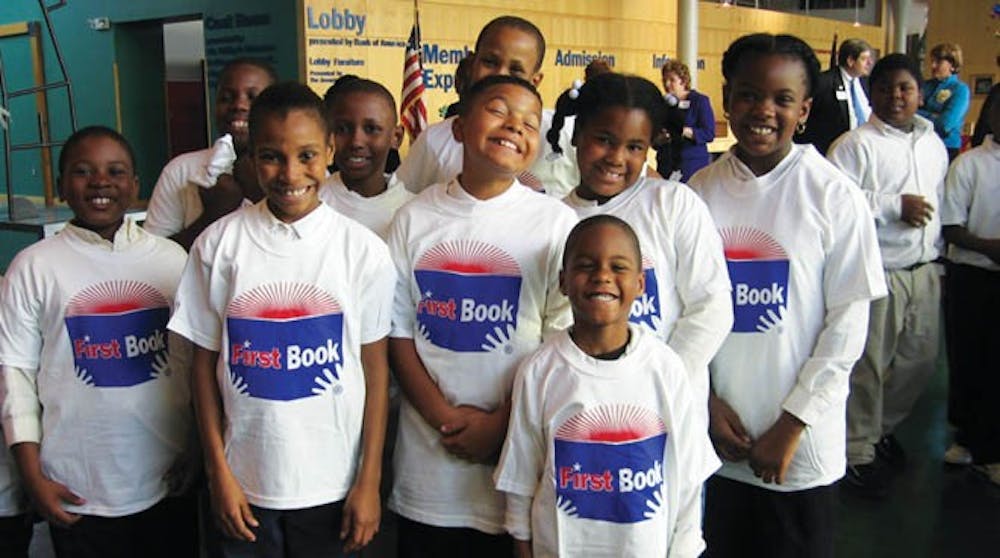Many Richmond children don't have access to the books that could offer them a bedtime tale, classroom read-aloud or companion for their blanket fort.
The University of Richmond's Pi Alpha chapter of Mortar Board - a national honor society for college seniors - has partnered with First Book - an organization that provides new books to disadvantaged children - to provide new books for children in low-income areas in Richmond. The chapter hopes to address the needs of local children while acknowledging the greater issue of illiteracy in America.
"Literacy is important because it provides the necessary foundation for nearly everything else in your life," said senior Sarah Vonderbrink, Mortar Board's president.
The university's chapter is competing with other national chapters to raise the most funds for First Book. Donations will be used to purchase books for Richmond children through the First Book Marketplace. First Book has provided more than 65 million books to children in need.
The chapter has raised $260, enough to buy 130 books, and is ranked eighth in the nation as of Nov. 1, Vonderbrink said. That is one-third of the chapter's goal of 400 books, which it will strive to reach by the Nov. 16 donation deadline.
A First Book study indicated there was access to just one book for every 300 children living in low-income neighborhoods, compared with 13 books for every one child in middle-income neighborhoods. Nationwide, 80 percent of the preschool and after-school programs serving disadvantaged children do not have any age-appropriate books for their programs.
Vonderbrink said she once heard about a teacher who asked her kindergarten students to bring in a book from home, and one child brought in a phone book because it was the only one he could find at his house.
"It's stories like these that make me so eager to help the cause of providing books to low-income areas," she said. "Books are something that many of us take for granted because we grew up with an abundance of them around the house, but it's important to realize that not everyone was given that same opportunity to explore reading."
Senior Megan Mitcheson, secretary of Mortar Board, said increasing literacy would help society overall.
"In my opinion, raising literacy rates in the United States is vital to closing the achievement gap," Mitcheson said. "This gap between high-income students and low-income students is a major threat to our nation."
According to a report by the U.S. Department of Education, 41 percent of fourth-grade boys and 35 percent of fourth-grade girls read below the basic level, and in low-income urban schools this figure increased to 70 percent.
First Book reports that 39 percent of American children -- about 28 million children -- live in low-income families, a percentage that continues to grow.
Enjoy what you're reading?
Signup for our newsletter
Less than 50 percent of children between birth and five years old are read to every day by family members, according to a Reading Acrosss the Nation Chartbook. By age two, children who are regularly read to display greater language comprehension, larger vocabularies and higher cognitive skills than their peers.
"Children from low-income communities are less likely to have books in the home, to have access to qualified teachers or to attend schools with adequate funding," Mitcheson said. "For these reasons, I believe that by providing low-income children with books, we can begin to address this achievement gap."
Almost 13 million American children live in poverty, which places them at higher risk for a wide range of problems, including factors that may impair brain development and affect social and emotional development, according to the First Book Web site.
"Illiteracy is one of the greatest predictors of crime and unemployment," Vonderbrink said. "Sadly, in some states, prison capacities are predicted based on the literacy rates of elementary school children."
Vonderbrink said these predictions were central to why she was dedicated to helping promote literacy in the urban Richmond community, as well as supporting First Book's national cause, "Reading is Leading."
The "Reading is Leading" Virtual Book Drive fundraiser, which allows donors to make their contributions online, is a first-year initiative for the chapter. Vonderbrink said the members of Mortar Board had offered to donate the books from the drive to Overby-Sheppard Elementary School, but were awaiting a formal acceptance.
Vonderbrink said one drawback was that the chapter did not get to deliver the books directly to the children, but the school would distribute the books as it saw fit.
Some of Richmond's organizations that have received book grants from First Bank chapters are Sacred Heart Center, Swansboro Elementary School, Glen Lea Elementary School, Peter Paul Development Center and the YMCA of Greater Richmond.
Contact staff writer Elizabeth Hardy at elizabeth.hardy@richmond.edu
Support independent student media
You can make a tax-deductible donation by clicking the button below, which takes you to our secure PayPal account. The page is set up to receive contributions in whatever amount you designate. We look forward to using the money we raise to further our mission of providing honest and accurate information to students, faculty, staff, alumni and others in the general public.
Donate Now



